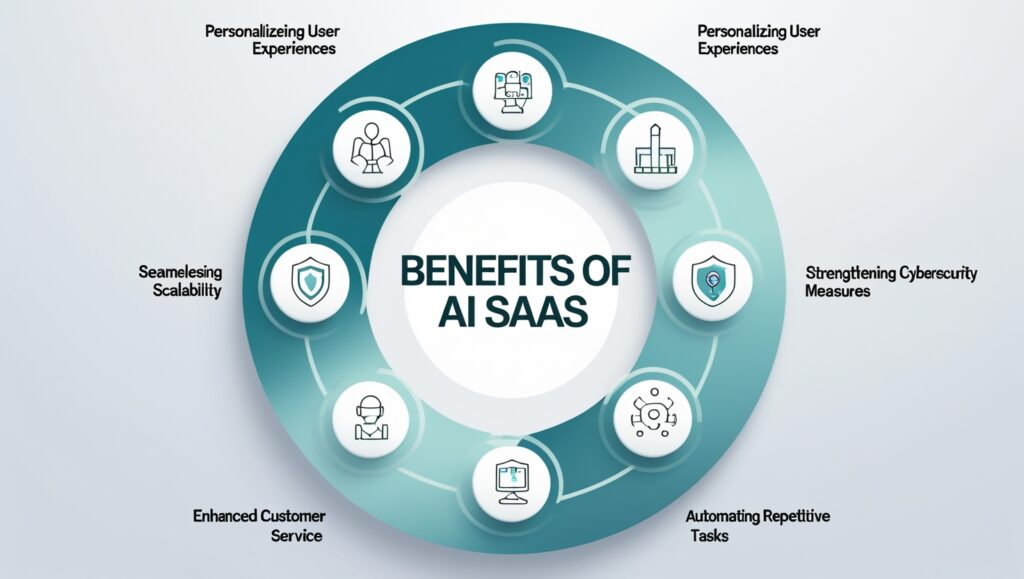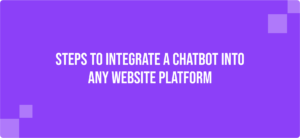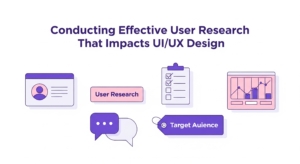click to get service View profile
Learn how AI SaaS for Business Growth can drive your company forward. Explore its benefits, challenges, and smart strategies to scale in today’s digital age.
In today’s fast-paced digital world, AI SaaS for Business Growth is transforming how businesses operate, scale, and innovate. By automating processes and providing data-driven insights, AI-powered SaaS solutions are becoming critical for organizations looking to enhance efficiency, stay competitive, and accelerate growth. These powerful tools offer a unique opportunity for businesses to unlock their full potential and thrive in the digital age.
But while the benefits are vast—from improved efficiency to enhanced customer experiences—there are also challenges to consider, including implementation complexity, data privacy, and scalability.
In this guide, we’ll explore how to use AI SaaS for business growth, break down its key benefits, address the common challenges, and highlight real-world opportunities to help you make smarter decisions in 2025 and beyond.
What is AI Saas?
AI SaaS refers to cloud-based software platforms that combines the power of AI (Artificial Intelligence) with the flexibility of SaaS (Software as a Service).
In simple terms, AI SaaS for Business Growth is a traditional SaaS product (like Zoom, Salesforce, or HubSpot) that’s upgraded with AI features. These enhancements help automate tasks, analyze data, and make smart decisions—all without the need for users to have advanced technical knowledge of AI.
Benefits of AI Saas

Integrating AI into SaaS platforms is no longer optional—it’s a must for businesses aiming to stay competitive in today’s rapidly changing market. AI SaaS for Business Growth is revolutionizing how companies operate, providing smarter solutions that enhance efficiency, decision-making, and overall performance. Let’s dive into the key benefits AI brings to the SaaS ecosystem:
- Personalized User Experiences: AI can tailor SaaS platforms to individual users by analyzing behavior patterns, preferences, and usage history. This leads to more relevant content, smarter recommendations, and a more engaging user experience—especially useful in sectors like e-commerce, education, and media.
- Automating Repetitive Tasks: AI-powered automation streamlines repetitive workflows such as data entry, customer onboarding, and email responses. This not only saves time but also minimizes human errors, allowing teams to focus on higher-value tasks.
- Predictive Analytics: By leveraging machine learning, SaaS products can forecast outcomes like customer churn, sales trends, or product demand. This empowers businesses to make proactive, data-driven decisions and improve strategic planning.
- Enhanced Customer Support: AI chatbots and virtual assistants provide instant, 24/7 support by handling FAQs, processing tickets, and learning from past interactions. This reduces support costs and ensures customers receive quick, consistent assistance.
- Strengthening Cybersecurity Measures: AI can be used to strengthen the security of SaaS applications by detecting and mitigating potential threats. This is remarkably helpful in applications such as cloud storage, where customer data breaches can have serious consequences. AI algorithms can identify abnormal user behavior and proactively detect and respond to security threats.
- Seamless Scalability: AI enables SaaS platforms to adapt automatically to increased demand by optimizing resources, managing workloads, and distributing traffic efficiently—critical for services expecting rapid user growth or seasonal surges.
Key Challenges of AI SaaS

1. Data Complexity
For AI SaaS for Business Growth to deliver maximum impact, it requires access to large amounts of high-quality, well-structured data. However, many SaaS companies face challenges with fragmented data stored in silos or inconsistent formats. These data issues can hinder the effectiveness of AI models, ultimately affecting their accuracy and reliability.
2. AI Talent Shortage
Implementing and maintaining AI SaaS for Business Growth requires specialized expertise in areas like machine learning, data science, and infrastructure. Unfortunately, many organizations lack this technical talent, making AI development slow, expensive, and prone to errors due to incorrect implementation steps.
3. Scalability issues
AI SaaS for Business Growth can greatly enhance the scalability of SaaS platforms, but ensuring reliable performance at scale is challenging. What works well in small-scale tests may struggle with heavy user loads or complex real-world scenarios. Achieving scalability requires extensive testing and significant computing resources—assets that not all companies have access to.
4. Privacy & Ethical Risks
AI SaaS for Business Growth often requires large datasets for training, raising significant concerns around data privacy and user consent. This is particularly crucial in industries like healthcare and finance, where handling sensitive information is a daily responsibility. Companies must navigate strict data regulations (e.g., GDPR) while ensuring their AI systems remain transparent, fair, and unbiased—adding layers of complexity to development.
5. Accountability Concerns
When AI SaaS for Business Growth systems make mistakes—especially in sensitive areas like compliance or legal tech—it’s critical to determine who is responsible. Many AI models act as “black boxes,” making it difficult to explain their decision-making process. This lack of transparency complicates accountability and underscores the need for clear, interpretable systems and regulatory oversight.
Popular AI SaaS Ideas to Kickstart in 2025

1. AI Logo Maker
What It Does: This AI tool allows users to generate professional, custom-made logos and brand visuals—such as business cards, brochures, or packaging—by simply inputting key brand details.
Why It Matters: Designing brand assets can be time-consuming and expensive. AI logo makers streamline the process, enabling businesses to quickly create unique visuals while saving on design costs.
Factsheet:
- Industry/Category: Marketing, Business Branding
- Revenue Models: Pay-per-logo, flat-rate subscription
- Successful Examples: Logomakerr, Logomaster.ai, Freepik Logo Maker, Vondy AI
Where to Start: Decide whether your platform will focus solely on logos or offer an all-in-one branding suite—including typography, color palettes, and packaging templates. Choose the right AI tools for design generation and user customization.
2. AI Video Summarizer
What It Does: This AI tool automatically converts video content—like online courses, meetings, and lectures—into clear, concise written summaries. No more manual transcribing or note-taking.
Why It Matters: People often spend valuable time extracting key insights from videos. With AI SaaS for Business Growth, this process is streamlined by offering instant summaries, and advanced versions can even answer user questions based on the video content, saving time and improving efficiency.
Factsheet:
- Industry/Category: EdTech, Research, Content Creation
- Revenue Models: Monthly subscription, pay-per-video
- Successful Example: ChatDox
Where to Start: Outline your feature set—will it focus only on summarization or include smart search and interactive Q&A? From there, choose core technologies like speech recognition, natural language processing (NLP), and machine learning to bring your vision to life.
3. AI Sales Automation
What It Does: This tool automates repetitive sales tasks like lead scoring, follow-up emails, CRM updates, and meeting scheduling using AI-powered workflows.
Why It Matters: Sales teams often spend valuable time on manual tasks instead of focusing on closing deals. With AI SaaS for Business Growth, automation takes care of the repetitive work, allowing sales teams to concentrate on building relationships and converting leads.
Factsheet:
- Industry/Category: Sales, CRM, B2B
- Revenue Models: Subscription plans based on team size or usage volume
- Successful Examples: Saleswhale, Clari, Drift, HubSpot Sales Hub
Where to Start: Define the specific part of the sales process your AI SaaS for Business Growth tool will automate first—whether it’s emails, pipeline management, or lead scoring. Then, integrate technologies like natural language processing (NLP), workflow automation, and CRM APIs to streamline operations and boost efficiency.
4. AI Customer Support Chatbot
What It Does: This AI-powered chatbot handles customer inquiries, resolves common issues, and provides 24/7 support through natural conversations—without needing human intervention.
Why It Matters: Traditional customer service can be slow and expensive. By implementing an AI SaaS for Business Growth chatbot, companies can reduce response times, enhance customer satisfaction, and allow human agents to focus on more complex issues.
Factsheet:
- Industry/Category: Customer Service, E-commerce, SaaS
- Revenue Models: Subscription tiers based on number of chats, integrations, or advanced features
- Successful Examples: Intercom, Zendesk AI, Tidio, Ada
Where to Start: Choose the core functions of your AI SaaS for Business Growth chatbot—such as FAQ automation, ticket creation, or multilingual support. Enhance its capabilities with technologies like NLP, intent recognition, and seamless API integrations with CRMs or helpdesk platforms.
5. AI Financial Assistance
What It Does: This AI tool analyzes financial data to help users with budgeting, forecasting, investment tracking, and personalized money management tips.
Why It Matters: Managing finances can be overwhelming and time-consuming. With AI SaaS for Business Growth, AI-powered assistants provide real-time insights, detect unusual spending patterns, and offer personalized advice to help users achieve their financial goals.
Factsheet:
- Industry/Category: Fintech, Personal Finance, SMB Solutions
- Revenue Models: Freemium model, tiered subscriptions, financial data partnerships
- Successful Examples: Cleo, YNAB, Mint, Fyle
Where to Start: Define the capabilities of your AI SaaS for Business Growth assistant—whether it’s basic budgeting, expense tracking, or smart investment advice. Leverage AI technologies like predictive analytics, rule-based automation, and secure data encryption to build trust and deliver value to users.
6. AI Human Resource Support
What It Does: This AI tool streamlines HR processes like candidate screening, interview scheduling, onboarding, employee engagement tracking, and even internal helpdesk queries.
Why It Matters: Traditional HR tasks can be repetitive and time-consuming. With AI SaaS for Business Growth, AI-powered tools streamline manual processes, accelerate hiring, and enhance the employee experience by enabling faster, data-driven decisions.
Factsheet:
- Industry/Category: HR Tech, Recruitment, Employee Experience
- Revenue Models: Subscription-based, pay-per-hire, enterprise licensing
- Successful Examples: Paradox, Leena AI, HireVue, Eightfold AI
Where to Start: Identify the key features of your AI SaaS for Business Growth tool—whether it’s recruitment automation, employee Q&A, or analytics—and integrate AI capabilities like natural language processing (NLP), resume parsing, and chatbots to enhance these functions.
Final thoughts
Adopting AI SaaS for Business Growth is no longer just a trend—it’s a game changer for businesses seeking efficiency, scalability, and innovation. From automating tasks to making smarter decisions, the opportunities AI presents are vast. However, businesses must navigate challenges like data privacy, scalability, and the need for specialized talent. With the right approach and careful integration, AI SaaS solutions can unlock tremendous value, driving sustained growth and long-term success.
As AI technologies continue to evolve, staying ahead of the curve and embracing these tools will be crucial for businesses that want to stay competitive in today’s fast-paced market. Embrace the future of business growth with AI, and you’ll be well-positioned to thrive in the digital age.
Frequently Asked Questions (FAQs)
1. What is the Difference between Traditional SaaS and AI Saas?
Traditional SaaS delivers software via the cloud, offering tools for tasks like project management, accounting, or communication without needing local installation. AI SaaS takes this further by embedding Artificial Intelligence (AI) into the software—enabling features like automation, personalization, predictive analytics, and natural language processing.
2. Why does design matter in AI Saas?
SaaS AI powered tools can be complex under the hood, so great design is what bridges that complexity for the end user. Intuitive interfaces, clear feedback, and explainable outputs are essential to help users understand what the AI is doing and why. Good design also builds trust, reduces user error, and ensures that even non-technical users can utilize.
3. How can AI Saas help small businesses?
AI SaaS solutions can empower small businesses by automating time-consuming tasks, improving customer engagement, and offering data-driven insights. From chatbots that handle support to tools that streamline marketing or financial planning, these solutions make advanced technology affordable and scalable—allowing small teams to do more with less.

